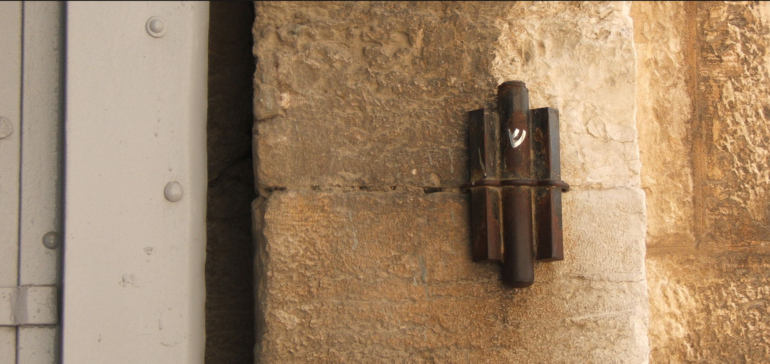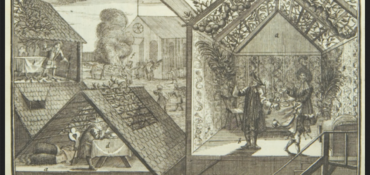
How My Bike Accident Helped Me Appreciate the Mitzvah of Mezuzah
July 8th was a brisk, sunny day in the wilderness near Vancouver, Canada. Our family celebrated my wife’s birthday with a mountain bike adventure through the gorgeous Stanley Park. As we careened down the bike paths, I captured the highlights with my Canon camera. Regretfully, I attempted the “stupid dad trick” of shooting video while riding. At considerable speed. I grabbed the front brake lever by accident and my finely-tuned hybrid bike stopped on a dime, flipping me over the handlebars and onto the pavement. I broke the fall with my hands and cut up one of my palms pretty badly. Embarrassed, I dusted myself off and got back on the bike, catching up to my kids who were oblivious to my aerial dexterity.
Thankfully, a nearby lifeguard patched me up and I was able to complete the ride with my family. We embarked on a six-mile hike into the Canadian Rockies, crossing the Lynn Canyon suspension bridge into a coniferous forest and a chain of pristine, cobalt blue lakes. My wrist started to throb. I figured I was letting too much blood get to the area because I was hiking with my arms hanging down. I fashioned a sling out of a sweatshirt, realizing that my injury was worse than initially suspected.
Back in Vancouver, the width of my wrist had doubled and was super-sensitive. This was bad news for me as a piano player. My kids accompanied me to urgent care, where the cheery attendant reported that I would have at least a three-hour wait, plus even longer to get an x-ray, and be charged $800 minimum that may not be covered by my U.S. insurance. With Shabbat coming in an hour, we left, bought a sling and a wrist brace at a drug store and returned to our rental.
The next morning, I led a spirited Mussaf at the local Chabad where a standing-room-only crowd gathered for services. During the lunch that followed, I shmoozed with a few local doctors. All of them told me to get an x-ray. Others told me to check my mezuzot. The x-ray I understood. But check my mezuzot? Wasn’t that just textbook Hasidic advice for preventing mishaps?
After returning from our inspiring adventure, my hand and wrist were on the mend, but I couldn’t shake the superstitious mezuzah message. I counted twenty of them in our house, including my recording studio. The new rabbi at the shul down the street was a sofer and offered to check them.
Why do we bother affixing parchment with ancient hieroglyphics to our every entrance (besides closets or bathrooms)? What has motivated Jews over the course of history to do so at their peril, knowing anti-Semites are on the prowl? Why would God command it and why is it so important that we mention the mitzvah when we say Shema twice a day?
This rabbi took down each mezuzah, ensuring he kept the batim (housing) and the klafim (scrolls) together. He scrutinized every detail with a powerful magnifying glass. Seven of the twenty were no longer kosher. The two on our front and back doors had weathered to the point where they were unreadable. Some were reparable; he was able to scrape away ink where letters were touching so that they could be put back into service. One might think, “This guy just wants to sell more mezuzot!” But he demonstrated why each was deficient and explained the laws specifying which flaws couldn’t be repaired.
After paying for seven new scrolls, the inspection fee and some new waterproof batim for the outside doors, we hung the final mezuzah. I felt a surreal sense of healing. Our sages insist that a mezuzah is not an amulet. The magic of hanging this parchment is the same as fulfilling any mitzvah— enhancing our connection with Hashem. However, some textual sources elucidate the concept of divine protection. King David writes, “God will guard your going and coming for all time,” a hint towards the efficacy of the mezuzah. The Talmud mentions that the mezuzah serves as a conduit for blessings for the home and its inhabitants. Mezuzot heighten our awareness that a home has a capacity for holiness. It’s more than just a place to hang our hat. The simple act of reaching to kiss a mezuzah when passing through a gateway has a powerful effect on one’s consciousness, as if even our dwellings wear tefillin.
This doorpost drama unfolded during the week of Shoftim, which begins, “Judges and officers shall you appoint in your gates (Devarim 16:18).” A grammatical anomaly begs inspection: “YOUR gates” is in the singular, not plural. In other words, we have to appoint judges in our own personal gates. Renowned kabbalist Rabbi Chaim Vital (1543-1620) suggests these gates refer to our sensory organs: sight, hearing, taste, touch, smell. Just like a mezuzah offers protection at the entrance to any given room, we establish spiritual guardians at the sources of input into our lives. As we live in an age of 24/7 bombardment of the senses, it is more relevant than ever to monitor it.
In the Shema, we mention the mitzvah to affix a mezuzah, responding to the divine imperative to guard and sanctify our physical and spiritual gates. This is the key to our success as individuals and as a nation. Maybe my bike accident needed to happen to remind me to guard myself, to slow down and fully appreciate Hashem’s creation. Remembering how blessed we are to have “gates” to guard is the ideal kavanah each time we reach up to kiss a mezuzah.
God slowly-but-surely returned my wrist to full function. I even got back on my bike. But now, I avoid the temptation to film as I ride.
If you found this content meaningful and want to help further our mission through our Keter, Makom, and Tikun branches, please consider becoming a Change Maker today.









